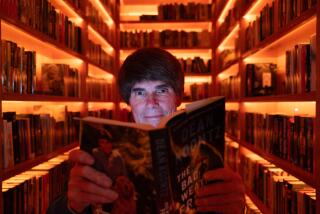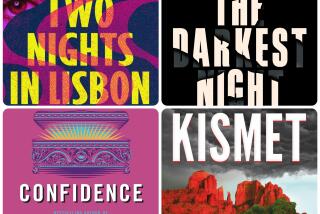Watchers by Dean R. Koontz (Putman’s: $17.95; 352 pp.)
- Share via
Animal liberationists will love “Watchers,” the latest quasi-Gothic thriller from best-selling California novelist Dean R. Koontz, who has previously scored with such “high-concept” titles as “Strangers,” “Phantoms” and “Whispers.”
Koontz’s latest confection is a yarn of recombinant DNA experiments on dogs at a government-sponsored research agency called Banodyne Laboratories. The laboratories sponsor something called the Francis Project, aimed, first, at endowing a certain golden retriever with human intelligence capable of spying on the Russians and, second, at creating “The Outsider,” a hybrid canine bred to be a lone killer. The two are to be a sort of Good Dog, Bad Dog team.
But something goes wrong, dreadfully wrong, and both dogs escape into bucolic Southern California, where they are pursued by a variety of good guys, bad guys, local gendarmes, feds, Soviet counteragents and confused veterinarians.
Luckily, the good dog, who is cleverly named “Einstein,” finds his way to a kindly former Vietnam Special Forces officer, a heartbroken widower whom Koontz dubs Travis Cornell. Through a series of subplots too complicated to even begin to explain, Travis and his girlfriend, Nora Devon, attempt to protect Einstein from the unfeeling world and above all from “The Outsider.” (Both beasts share an affection, touchingly enough, for Mickey Mouse.)
Travis and Nora grow closer. He is trying to recover from the trauma of ‘Nam and the subsequent death of his wife. She has been saved from an overly glandular television repairman through Einstein’s sixth sense. Meanwhile, danger still lurks for Einstein.
On his trail are a hired hit man, the county sheriff, a federal agent, and, needless to say, the Outsider, who seems to have an advanced case of sibling rivalry.
I won’t reveal the ending of this veterinary epic. But it may be worth observing that the real purpose of fantasized terror is not the plot, per se, and certainly not the prose style with which the narrative unfolds. What accounts for its popularity is its philosophy. It works like a metaphysical Movie of the Week on the burning social, political and ethical questions of our time.
As one law-enforcement officer tells another in “Watchers”: “Honest to God, Walt, when you see that animal in action, see what Weatherby created, it gives you enormous hope for this sorry species of ours. (. . .) I mean, if we can do these amazing things, if we can bring such a wonder into the world, then there’s something of profound value in us no matter what the pessimists and doomsayers believe.”
Just as the traditional mystery and tough guy novels have been subverted into morality plays, so the Gothics have become mystery plays, carrying with them the eerie subtext of fear about the unknown scientific future. That they are so often violent only underscores the immediacy of their concerns.
Having said that, one is forced to add that while such meta-societal musings may become serious literature in the hands of an Aldous Huxley or a Gore Vidal, the work of Dean R. Koontz falls considerably short of that mark.
Any book that persistently refers to its protagonist as “fur face” (Travis to “fur face”: “You turned me around in one day. I swear, it’s like you were sent to show me that life’s mysterious, strange, and full of wonders”) forfeits its right to escape without a snicker.
But in an extra-literary sense, the probable popularity of “Watchers” and its fictional kindred spirits indicates something disturbing about our fascination with military violence and with the violence of our own souls. And you don’t have to be Einstein to figure out that this broader fascination betokens problems that can’t be resolved through wish-fulfillment fiction.
More to Read
Sign up for our Book Club newsletter
Get the latest news, events and more from the Los Angeles Times Book Club, and help us get L.A. reading and talking.
You may occasionally receive promotional content from the Los Angeles Times.









